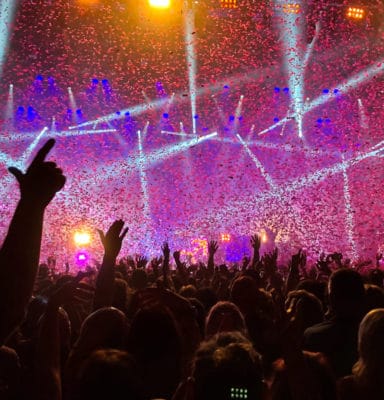The event industry is waking up to a new reality. Not only is technology playing a central role in the pandemic recovery, but it’s also reshaping the landscape. This will look like when conferences and exhibitions regain some sense of normalcy.
Screens will become windows.
Screens of all shapes and sizes—mobile devices, displays, interactive kiosks, and LED back walls—will be the glue that holds hybrid events together. In-person and remote audience members will use them to access each other’s content and experience.
There will be haves and have nots
Event planners will divide into two groups: analog and digital. One group will manage events with spreadsheets, post-it notes, and paper. The other will automate and digitize tasks, exploring the full range of event technology and tools.
Events will be smarter.
Digital events have delivered more and better attendee behavioral data than in-person events; the latter will ramp up their Internet of Things (IoT) innovation to compete. Sensors, beacons, and tags will be attached to walls, furniture, and badges to track attendee movements.
Safety will remain a priority.
Pandemic safety measures are likely a permanent budget line item for events. As a result, solutions from Clear, Safe Expo, Crowdpass, and TACKL Health could be among those fueling further growth in the health-related event technology category.
Virtual platforms will evolve.
No matter where virtual event platforms came from–mobile apps, networking solutions, or the ground up–they will continue to evolve. Community platforms, eCommerce marketplaces, or virtual reality venues are possible options.
Attendees will have even more choices.
The potential ways for attendees to experience an event will grow. Today, they can access events in person or online, live or on-demand, in a skirt and heels or workjamas. When the Covid-19 smoke clears (or at least becomes less impactful), other realities (Facebook is talking about the Metaverse) will emerge.
Connectivity will be king.
Sure, the content will remain highly important, but it’s not going anywhere without bandwidth and speed. Venues will invest in new technologies inside and outside the facility to stay competitive, including 5G networks, to quickly get the content up and out.
Hybrids will metamorphose
Although the term hybrid is loose, events now known as hybrid events will continuously change. Imagine networking-only in-person events with all-remote speakers and presentations embedded (via robots, displays, or holograms) in the live event. What about progressive events in which layers of technology and experience are added each day (or at night)? The Cloud is the limit.
Organizers will get better at digital.
With pandemic-forced innovation, event organizers will accept that digital transformation is crucial to their survival. Organizers will overcome the obstacles—virtual exhibitor satisfaction, monetizing digital products and experiences, and data sharing and ownership.
Event suppliers will continue to change lanes.
In the spirit of adaptation and the desire for revenue and business continuity, event industry suppliers—creative agencies, general services contractors, venues, and technology platform providers—will pursue opportunities outside their usual lines of business. With venture capital pouring in, expect the unexpected.
Many have mentioned that the pandemic was an opportunity as a calamity. If that’s true, the future looks bright for events with the proper event technology.

